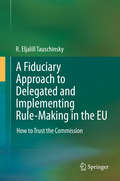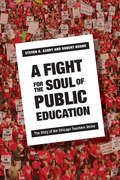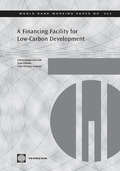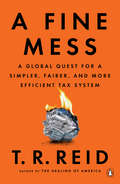- Table View
- List View
A Female Activist Elite in Italy (1890–1920): Its International Network and Legacy
by Manuela Mosca Elena LaurenziThis book explores and traces the progressive activism and radical ideas of several elite women in Italy beginning in the early 20th century. It discusses the shared political culture that shaped the thinking and the activity of these women, mainly oriented towards political philanthropy and work, seen as the cornerstone of a comprehensive redefinition of gender relations. It also discusses the connections linking them to an international network of women involved in similar political actions and economic initiatives addressing women’s' interests, as well as their legacy for the next generations. With essays from a range of scholars, this book provides an interdisciplinary framework for understanding these activists and deals with methodological and historiographical issues in reconstructing women’s contribution to history.
A Feminist Theory of Refusal
by Bonnie HonigAn acclaimed political theorist offers a fresh, interdisciplinary analysis of the politics of refusal, highlighting the promise of a feminist politics that does not simply withdraw from the status quo but also transforms it. The Bacchae, Euripides’s fifth-century tragedy, famously depicts the wine god Dionysus and the women who follow him as indolent, drunken, mad. But Bonnie Honig sees the women differently. They reject work, not out of laziness, but because they have had enough of women’s routine obedience. Later they escape prison, leave the city of Thebes, explore alternative lifestyles, kill the king, and then return to claim the city. Their “arc of refusal,” Honig argues, can inspire a new feminist politics of refusal. Refusal, the withdrawal from unjust political and economic systems, is a key theme in political philosophy. Its best-known literary avatar is Herman Melville’s Bartleby, whose response to every request is, “I prefer not to.” A feminist politics of refusal, by contrast, cannot simply decline to participate in the machinations of power. Honig argues that a feminist refusal aims at transformation and, ultimately, self-governance. Withdrawal is a first step, not the end game. Rethinking the concepts of refusal in the work of Giorgio Agamben, Adriana Cavarero, and Saidiya Hartman, Honig places collective efforts toward self-governance at refusal’s core and, in doing so, invigorates discourse on civil and uncivil disobedience. She seeks new protagonists in film, art, and in historical and fictional figures including Sophocles’s Antigone, Ovid’s Procne, Charlie Chaplin’s Tramp, Leonardo da Vinci’s Madonna, and Muhammad Ali. Rather than decline the corruptions of politics, these agents of refusal join the women of Thebes first in saying no and then in risking to undertake transformative action.
A Few Acres of Ice: Environment, Sovereignty, and "Grandeur" in the French Antarctic
by Janet Martin-NielsenA Few Acres of Ice is an in-depth study of France's complex relationship with the Antarctic, from the search for Terra Australis by French navigators in the sixteenth century to France's role today as one of seven states laying claim to part of the white continent. Janet Martin-Nielsen focuses on environment, sovereignty, and science to reveal not only the political, commercial, and religious challenges of exploration but also the interaction between environmental concerns in polar regions and the geopolitical realities of the twenty-first century.Martin-Nielsen details how France has worked (and at times not worked) to perform sovereignty in Terre Adélie, from the territory's integration into France's colonial empire to France's integral role in making the environment matter in Antarctic politics. As a result, A Few Acres of Ice sheds light on how Terre Adeìlie has altered human perceptions and been constructed by human agency since (and even before) its discovery.
A Few Good Gays: The Gendered Compromises behind Military Inclusion
by Cati ConnellThe US military has done an about-face on gender and sexuality policy over the last decade, ending Don’t Ask, Don’t Tell, restrictions on women in combat, and transgender exclusion. Contrary to expectations, servicemembers have largely welcomed cisgender LGB individuals—yet they continue to vociferously resist trans inclusion and the presence of women on the front lines. In the minds of many, the embodied "deficiencies" of cisgender women and trans people of all genders puts others—and indeed, the nation—at risk. In this book, Cati Connell identifies the homonormative bargain that underwrites these uneven patterns of reception—a bargain that comes with significant concessions, upholding and even exacerbating race, class, and gender inequality in the pursuit of sexual equality. In this handshake deal, even the widespread support for open LGB service is highly conditional, revocable upon violation of the bargain. Despite the promise of inclusivity, in practice, the military has made room only for a "few good gays," to the exclusion of all others. But should equal access be the goal? How did we get from there to here? And where do we go next? In analyzing inclusion as a social movement aspiration, Connell shows that its steep price is exacted through the continued abjection of queered Others, both at home and abroad.
A Few Lawless Vagabonds: Ethan Allen, the Republic of Vermont, and the American Revolution
by David BennettThis surprising true story of Vermont&’s collusion with the British &“may be the best American Revolutionary War era book to come out in years&” (Military Review). This riveting work of political and military history provides an account of the three-way relationship between Ethan Allen, the Republic of Vermont (1777–1791), and the British in Canada during the American Revolution. Ethan Allen was a prime mover in the establishment of the Republic, then led the fight to maintain its independence from the &“predatory states&” of New Hampshire, New York, and Massachusetts; from the American Continental Congress; and from British attacks on the new state. In order to defend Vermont&’s independence, Ethan Allen even went so far as engaging in secret, unlawful negotiations with the British in Canada, aimed at turning Vermont into a &“separate Government under the Crown.&” The attempts of the Allen family to maintain Vermont&’s independence from its neighbors were unsuccessful: Vermont became the fourteenth state in 1791. A Few Lawless Vagabonds is the first systematic attempt, using archival sources, to show that the Allens were utterly serious in their aim to turn Vermont into a Crown colony, a project which came close to success in late 1781. The portrait of Ethan Allen that emerges in this book is not of a warrior hero of the American Revolution but of a successful Vermont nationalist who is justly celebrated as the principal founder of the State of Vermont—a rare combination of patriot and betrayer of the public trust.
A Fiduciary Approach to Delegated and Implementing Rule-Making in the EU: How to Trust the Commission
by R. Eljalill TauschinskyThis book focuses on the evaluation of delegated and implementing rule-making, based on Articles 290 and 291 TFEU. These articles have attracted considerable attention since their introduction in 2009, and their implementation is one of the most hotly debated questions in European Administrative Law. The book takes up this timely topic, discusses it in an innovative way and offers valuable new insights. Delegated and implementing acts are the most common form of EU legal acts. However, despite their ubiquity and relevance, it is unclear how the Commission’s powers to adopt these important acts relates to subjects’ democratic rights. Accordingly, the book explores the question of how the Commission’s powers to adopt delegated and implementing acts can be justified. The relationship between the Commission and the persons within the Member States who are directly affected by its rule-making should be seen, the book argues, as one of institutional trust, and as a result as a fiduciary relationship. The book begins by defining the theoretical conditions for a justificatory approach, before explaining the background and foundations of fiduciary law. It then links this theoretical perspective with the realities of delegated and implementing acts, describing how the various roles in fiduciary relationships map onto the rule-making process that produces delegated and implementing acts, and explains how the fundamental tenet of fiduciary relationships – loyalty – can be included in the rule-making process.
A Field Guide to Community Based Adaptation
by Tim MageeThe world's poor will be the most critically affected by a changing climate—and yet their current plight isn't improving rapidly enough to fulfill the UN’s Millennium Development Goals. If experienced development organizations are finding it difficult to solve decades-old development problems, how will they additionally solve new challenges driven by climate change? This book illustrates how including community members in project design and co-management leads to long-lasting, successful achievement of development and adaptation goals. This field guide provides a system of building block activities for staff on the ground to use in developing and implementing successful adaptation to climate change projects that can be co-managed and sustained by communities. Based on years of use in 129 different countries, the techniques illustrated in this field guide use a step-by-step progression to lead readers through problem assessment, project design, implementation, and community take over. The book equips development staff with all the tools and techniques they need to improve current project effectiveness, to introduce community based adaptation into organizational programming and to generate new projects. The techniques provided can be applied to broad range of challenges, from agriculture and soil and water challenges, to health concerns, flood defences and market development. The book is supported by a user-friendly website updated by the author, where readers can download online resources for each chapter which they can tailor to their own specific projects. This practical guide is accessible to all levels of development staff and practitioners, as well as to students of development and environmental studies.
A Field Guide to Ghost Guns: For Police and Forensic Investigations
by Robert E. WalkerWhile it has always been legal for a citizen in the United States to manufacture their own firearm, the sale and distribution of such items is illegal under current U.S. law. The primary impediment to individuals making their own weapons has been access to the tooling and machinery required to convert raw materials into finished parts for assembly. However, in the last fifteen years this paradigm has changed drastically. Home builders and companies have emerged to support individuals who choose to produce their own firearm. Kits with receivers and gun components are available for hobbyists, as are 3-D printable gun designs, downloadable from the Internet in some cases. This phenomenon has led to the term ghost guns: firearms whose existence is not reported to any third party and therefore whose existence is unknown and, largely, untraceable. A Field Guide to Ghost Guns: For Police and Forensic Investigators provides a useful brief for field investigators on the technical aspects of the self-made firearm, so-called "ghost guns. The first book to focus on the emergent issue of ghost guns, coverage addresses the history of firearms making and manufacture in the U.S.—including regulated and nonregulated manufacturing, details firearm components and accessories, how to assemble a Firearm, an overview of common Types of ghost guns, and investigative considerations. Though there have been increased calls to regulate guns in the wake of numerous mass shootings, the proliferation of ghost guns—and their increasing use in crimes—would likely require additional laws and regulatory measures. Since there are few knowledgeable firearm practitioners in the field, who can render qualified opinions on the subject, author Robb Walker has taken a practical, pragmatic approach to the topic. The book defines terminology, provides photographs, and explains the concepts surrounding homemade firearm in clear, easy to understand terms. Key Features: Addresses the technology and technical aspects in creating, assembling, and/or modifying homemade firearms—both printable and assembled from pre-fabricated components Discusses the rationale and motivations behind making one’s own firearm Outlines what is currently legal and illegal under U.S. law, providing indicators for investigators for illegally configured firearms A Field Guide to Ghost Guns addresses the pressing need for a practical reference on the topic. The book provides police investigators and forensic ballistics experts a useful aid to understand legal aspects and to identify ghost guns, and the paraphernalia—tooling and machinery, and otherwise—indicative of gun making in a non-formal, factory setting.
A Field Guide to Left-Wing Wackos
by Kfir Alfia Alan LiptonHere's everything you need to know about Anarchists, Peace Moms, Granolas, and many other types of left-wing wackos...so you can annoy them before they annoy you! Dreadlocks. Megaphones. The stench of patchouli oil and bad ideas. Who are these ridiculous characters clogging our streets and college campuses, protesting everything from "American imperialism" to genetically modified food to tax cuts? And how can an articulate, employed, sane person like yourself glean entertainment value from their antics? Kfir Alfia and Alan Lipton, the founders of ProtestWarrior, America's leading antiactivist organization, have spent years studying the eighteen distinct species of leftist protesters in our midst-everyone from Blacktivists to Hacktivists to Islamothugs. And in this hilarious guide, they will teach you: How to easily differentiate among similar species like Communists, Anarchists, and College Students. How to recognize the subtleties of the Performance Artist versus the Dylan Wannabe and the Acid Freak versus the Granola. How to confront, tease and taunt these wackos with witty comebacks, demolishing zingers, and infuriating facts. (Here's one: "War never solved anything ... except for slavery, fascism, Nazism and communism!") A Field Guide to Left Wing Wackos is the manual you want at your fingertips to defend yourself and the American Way-and have some fun while you're at it.
A Field Guide to White Supremacy
by Kathleen Belew and Ramón A. GutiérrezDrawing explicit lines, across time and a broad spectrum of violent acts, to provide the definitive field guide for understanding and opposing white supremacy in America Hate, racial violence, exclusion, and racist laws receive breathless media coverage, but such attention focuses on distinct events that gain our attention for twenty-four hours. The events are presented as episodic one-offs, unfortunate but uncanny exceptions perpetrated by lone wolves, extremists, or individuals suffering from mental illness—and then the news cycle moves on. If we turn to scholars and historians for background and answers, we often find their knowledge siloed in distinct academic subfields, rarely connecting current events with legal histories, nativist insurgencies, or centuries of misogynist, anti-Black, anti-Latino, anti-Asian, and xenophobic violence. But recent hateful actions are deeply connected to the past—joined not only by common perpetrators, but by the vast complex of systems, histories, ideologies, and personal beliefs that comprise white supremacy in the United States. Gathering together a cohort of researchers and writers, A Field Guide to White Supremacy provides much-needed connections between violence present and past. This book illuminates the career of white supremacist and patriarchal violence in the United States, ranging across time and impacted groups in order to provide a working volume for those who wish to recognize, understand, name, and oppose that violence. The Field Guide is meant as an urgent resource for journalists, activists, policymakers, and citizens, illuminating common threads in white supremacist actions at every scale, from hate crimes and mass attacks to policy and law. Covering immigration, antisemitism, gendered violence, lynching, and organized domestic terrorism, the authors reveal white supremacy as a motivating force in manifold parts of American life. The book also offers a sampling of some of the most recent scholarship in this area in order to spark broader conversations between journalists and their readers, teachers and their students, and activists and their communities. A Field Guide to White Supremacy will be an indispensable resource in paving the way for politics of alliance in resistance and renewal.
A Field in Flux: Sixty Years of Industrial Relations
by Robert B. McKersieA Field in Flux chronicles the extraordinary journey of industrial and labor relations expert Robert McKersie. One of the most important industrial relations scholars and leaders of our time, McKersie pioneered the study of labor negotiations, helping to formulate the concepts of distributive and integrative bargaining that have served as analytical tools for understanding the bargaining process more generally.The book provides a window into McKersie's life and work and its impact on the evolution of labor and industrial relations. Spanning six decades, the reader learns about the intersection of labor and the Civil Rights movement, the watershed moment of the Air Traffic Controller's Strike, his relationship with George Schultz, the shift from labor relations to human resource management, and McKersie's role in the seminal cases (Motorola, GM, Toyota) of the labor movement. A Field in Flux serves two important functions: it demonstrates how people have influenced past employment policies and practices when called to action in critical situations, and it seeks to instill confidence in those who will be called on to address the big challenges facing the future of work today and in the years to come. During a time when the basic values of industrial relations are being challenged and violated, McKersie argues that the profession must adapt to the changing world of work and not forget about the value placed on efficiency, equity, and inclusive employment policies and practices.
A Fierce Glory: Antietam--The Desperate Battle That Saved Lincoln and Doomed Slavery
by Justin MartinOn September 17, 1862, the "United States" was on the brink, facing a permanent split into two separate nations. America's very future hung on the outcome of a single battle--and the result reverberates to this day. Given the deep divisions that still rive the nation, given what unites the country, too, Antietam is more relevant now than ever.The epic battle, fought near Sharpsburg, Maryland, was a Civil War turning point. The South had just launched its first invasion of the North; victory for Robert E. Lee would almost certainly have ended the war on Confederate terms. If the Union prevailed, Lincoln stood ready to issue the Emancipation Proclamation. He knew that freeing the slaves would lend renewed energy and lofty purpose to the North's war effort. Lincoln needed a victory to save the divided country, but victory would come at a price. Detailed here is the cannon din and desperation, the horrors and heroes of this monumental battle, one that killed 3,650 soldiers, still the highest single-day toll in American history.Justin Martin, an acclaimed writer of narrative nonfiction, renders this landmark event in a revealing new way. More than in previous accounts, Lincoln is laced deeply into the story. Antietam represents Lincoln at his finest, as the grief-racked president--struggling with the recent death of his son, Willie--summoned the guile necessary to manage his reluctant general, George McClellan. The Emancipation Proclamation would be the greatest gambit of the nation's most inspired leader. And, in fact, the battle's impact extended far beyond the field; brilliant and lasting innovations in medicine, photography, and communications were given crucial real-world tests. No mere gunfight, Antietam rippled through politics and society, transforming history.A Fierce Glory is a fresh and vibrant account of an event that had enduring consequences that still resonate today.
A Fiery Gospel: The Battle Hymn of the Republic and the Road to Righteous War (Religion and American Public Life)
by Richard M. GambleSince its composition in Washington's Willard Hotel in 1861, Julia Ward Howe's "Battle Hymn of the Republic" has been used to make America and its wars sacred. Few Americans reflect on its violent and redemptive imagery, drawn freely from prophetic passages of the Old and New Testaments, and fewer still think about the implications of that apocalyptic language for how Americans interpret who they are and what they owe the world. In A Fiery Gospel, Richard M. Gamble describes how this camp-meeting tune, paired with Howe's evocative lyrics, became one of the most effective instruments of religious nationalism. He takes the reader back to the song's origins during the Civil War, and reveals how those political and military circumstances launched the song's incredible career in American public life. Gamble deftly considers the idea behind the song—humming the tune, reading the music for us—all while reveling in the multiplicity of meanings of and uses to which Howe's lyrics have been put. "The Battle Hymn of the Republic" has been versatile enough to match the needs of Civil Rights activists and conservative nationalists, war hawks and peaceniks, as well as Europeans and Americans. This varied career shows readers much about the shifting shape of American righteousness. Yet it is, argues Gamble, the creator of the song herself—her Abolitionist household, Unitarian theology, and Romantic and nationalist sensibilities—that is the true conductor of this most American of war songs. A Fiery Gospel depicts most vividly the surprising genealogy of "The Battle Hymn of the Republic," and its sure and certain position as a cultural piece in the uncertain amalgam that was and is American civil religion.
A Fight for the Soul of Public Education: The Story of the Chicago Teachers Strike
by Robert Bruno Steven AshbyIn reaction to the changes imposed on public schools across the country in the name of "education reform," the Chicago Teachers Union redefined its traditional role and waged a multidimensional fight that produced a community-wide school strike and transformed the scope of collective bargaining into arenas that few labor relations experts thought possible. Using interviews, first-person accounts, participant observation, union documents, and media reports, Steven K. Ashby and Robert Bruno tell the story of the 2012 strike that shut down the Chicago school system for seven days. A Fight for the Soul of Public Education takes into account two overlapping, parallel, and equally important stories. One is a grassroots story of worker activism told from the perspective of rank-and-file union members and their community supporters. Ashby and Bruno provide a detailed account of how the strike became an international cause when other teachers unions had largely surrendered to corporate-driven education reform. The second story describes the role of state and national politics in imposing educational governance changes on public schools and draconian limitations on union bargaining rights. It includes a detailed account of the actual bargaining process revealing the mundane and the transcendental strategies of both school board and union representatives.
A Fighting Chance
by Elizabeth WarrenAn unlikely political star tells the inspiring story of the two-decade journey that taught her how Washington really works—and really doesn’t As a child in small-town Oklahoma, Elizabeth Warren yearned to go to college and then become an elementary school teacher—an ambitious goal, given her family’s modest means. Early marriage and motherhood seemed to put even that dream out of reach, but fifteen years later she was a distinguished law professor with a deep understanding of why people go bankrupt. Then came the phone call that changed her life: could she come to Washington DC to help advise Congress on rewriting the bankruptcy laws? Thus began an impolite education into the bare-knuckled, often dysfunctional ways of Washington. She fought for better bankruptcy laws for ten years and lost. She tried to hold the federal government accountable during the financial crisis but became a target of the big banks. She came up with the idea for a new agency designed to protect consumers from predatory bankers and was denied the opportunity to run it. Finally, at age 62, she decided to run for elective office and won the most competitive—and watched—Senate race in the country. In this passionate, funny, rabble-rousing book, Warren shows why she has chosen to fight tooth and nail for the middle class—and why she has become a hero to all those who believe that America’s government can and must do better for working families.
A Fighting Chance
by Elizabeth WarrenA NEW YORK TIMES BESTSELLER An unlikely political star tells the inspiring story of the two-decade journey that taught her how Washington really works—and really doesn't—in A Fighting ChanceAs a child in small-town Oklahoma, Elizabeth Warren yearned to go to college and then become an elementary school teacher—an ambitious goal, given her family's modest means. Early marriage and motherhood seemed to put even that dream out of reach, but fifteen years later she was a distinguished law professor with a deep understanding of why people go bankrupt. Then came the phone call that changed her life: could she come to Washington DC to help advise Congress on rewriting the bankruptcy laws?Thus began an impolite education into the bare-knuckled, often dysfunctional ways of Washington. She fought for better bankruptcy laws for ten years and lost. She tried to hold the federal government accountable during the financial crisis but became a target of the big banks. She came up with the idea for a new agency designed to protect consumers from predatory bankers and was denied the opportunity to run it. Finally, at age 62, she decided to run for elective office and won the most competitive—and watched—Senate race in the country. In this passionate, funny, rabble-rousing book, Warren shows why she has chosen to fight tooth and nail for the middle class—and why she has become a hero to all those who believe that America's government can and must do better for working families.
A Financing Facility for Low-Carbon Development in Developing Countries
by Philippe Ambrosi Ivan ZelenkoThis paper proposes an innovative financing mechanism, known as the Low Carbon Development Facility (LCDF) that would bring additional investment financing at concessional rates to unlock low carbon development projects in non-Annex 1 countries, increasing project-based emissions avoidance in these countries. The LCDF could be a modality of the Copenhagen Green Climate Fund to implement the financial pledges made by Annex 1 countries as a result of Copenhagen and post-COP15 negotiations to support projects, programs, policies and/or other activities in developing countries related to NAMAs. LCDF will not substitute the Global Environment Facility (GEF) and the Clean Technology Fund (CTF) and would rather support the innovative projects pioneered by these instruments.
A Fine Mess: A Global Quest for a Simpler, Fairer, and More Efficient Tax System
by T. R. ReidThe U.S. tax code is a total write-off. Crammed with loopholes and special interest provisions, it works for no one except tax lawyers, accountants, and huge corporations. Not for the first time, we have reached a breaking point. That happened in 1922, and again in 1954, and again in 1986. In other words, every thirty-two years. Which means that the next complete overhaul is due in 2018. But what should be in this new tax code? Can we make the U.S. tax system simpler, fairer, and more efficient? Yes, yes, and yes. Can we cut tax rates and still bring in more revenue? Yes. Other rich countries, from Estonia to New Zealand to the UK—advanced, high-tech, free-market democracies—have all devised tax regimes that are equitable, effective, and easy on the taxpayer. But the United States has languished. So byzantine are the current statutes that, by our government’s own estimates, Americans spend six billion hours and $10 billion every year preparing and filing their taxes. In the Netherlands that task takes a mere fifteen minutes! Successful American companies like Apple, Caterpillar, and Google effectively pay no tax at all in some instances because of loopholes that allow them to move profits offshore. Indeed, the dysfunctional tax system has become a major cause of economic inequality. In A Fine Mess, T. R. Reid crisscrosses the globe in search of the exact solutions to these urgent problems. With an uncanny knack for making a complex subject not just accessible but gripping, he investigates what makes good taxation (no, that’s not an oxymoron) and brings that knowledge home where it is needed most. Never talking down or reflexively siding with either wing of politics, T. R. Reid presses the case for sensible root-and-branch reforms with a companionable ebullience. This affects everyone. Doing our taxes will never be America's favorite pastime, but it can and should be so much easier and fairer.
A Fire In Their Hearts: Yiddish Socialists In New York
by Tony MichelsIn a compelling history of the Jewish community in New York during four decades of mass immigration, Tony Michels examines the defining role of the Yiddish socialist movement in the American Jewish experience. <p><p> The movement, founded in the 1880s, was dominated by Russian-speaking intellectuals, including Abraham Cahan, Mikhail Zametkin, and Chaim Zhitlovsky. Socialist leaders quickly found Yiddish essential to convey their message to the Jewish immigrant community, and they developed a remarkable public culture through lectures and social events, workers' education societies, Yiddish schools, and a press that found its strongest voice in the mass-circulation newspaper Forverts. <p> Arguing against the view that socialism and Yiddish culture arrived as Old World holdovers, Michels demonstrates that they arose in New York in response to local conditions and thrived not despite Americanization, but because of it. And the influence of the movement swirled far beyond the Lower East Side, to a transnational culture in which individuals, ideas, and institutions crossed the Atlantic. New York Jews, in the beginning, exported Yiddish socialism to Russia, not the other way around. <p> The Yiddish socialist movement shaped Jewish communities across the United States well into the twentieth century and left an important political legacy that extends to the rise of neoconservatism. A story of hopeful successes and bitter disappointments, A Fire in Their Hearts brings to vivid life this formative period for American Jews and the American left.
A Fire So Wild: A Novel
by Sarah Ruiz-GrossmanZibby Mag, Electric Literature, The Rumpus, and She Reads Most Anticipated Book of the Year"A complex dissection of the impacts of climate change, with an array of characters who feel true and affecting, A Fire So Wild tackles not only a terrifying natural disaster, but the scorching inequality of the aftermath, and demands that we don't look away." -- Charlotte McConaghy, New York Times bestselling author of Once There Were WolvesWith the emotional echoes of Little Fires Everywhere and the lush atmosphere of Disappearing Earth, a riveting debut novel in which a wildfire creeps toward Berkeley, California, igniting tensions as characters from all walks of life confront the injustices lying beneath the city’s surface.As a wildfire threatens Berkeley, the city’s inhabitants are forced to reckon with the cracks in the lives they've built.Abigail, a wealthy homeowner, decides to throw a lavish birthday in a hillside mansion to raise money for the city’s newest affordable housing project—and prove to her family that she’s made something worthwhile of her life. Sunny, a construction worker who sleeps in a van along the bay’s shore, is in the running for an apartment—but only if enough funds are raised at the party.As the heat and smoke from the approaching blaze descend upon the town, tensions rise and residents—young and old, haves and have nots—confront the inequities laid bare, and the fragility of building a life in a world on fire.Alternating among a colorful cast of characters, A Fire So Wild is a timely, tautly paced novel that questions why when everything burns, not everyone is left with scars.
A Fire in Zion: The Israeli-Palestinian Search for Peace
by Mark PerryAttempts to reach peace between Israel and the Palestinians.
A Firing Offense: A Novel
by David Ignatius"A dynamic thriller with the coolest, smartest journalist that fiction ever produced." —Ben Bradlee, Washington PostWhen rising-star reporter Eric Truell accepts information from a maverick CIA agent, he becomes enmeshed in an international trade war in which even his own newspaper may be an unsuspecting participant. When Eric's sources tell him there is a spy inside the newsroom, he is tempted to cross a dangerous professional line and risk his career—possibly even his life—to find the truth.
A First Class Temperament: The Emergence of Franklin Roosevelt, 1905-1928
by Geoffrey C. WardIn this classic of American biography, based upon thousands of original documents, many never previously published, the prize-winning historian Geoffrey C. Ward tells the dramatic story of Franklin Roosevelt's unlikely rise from cloistered youth to the brink of the presidency with a richness of detail and vivid sense of time, place, and personality usually found only in fiction.<P> In these pages, FDR comes alive as a fond but absent father and an often unfeeling husband--the story of Eleanor Roosevelt's struggle to build a life independent of him is chronicled in full-as well as a charming but pampered patrician trying to find his way in the sweaty world of everyday politics and all-too willing willing to abandon allies and jettison principle if he thinks it will help him move up the political ladder. But somehow he also finds within himself the courage and resourcefulness to come back from a paralysis that would have crushed a less resilient man and then go on to meet and master the two gravest crises of his time.<P> This is a sequel to Before the Trumpet: Young Franklin Roosevelt, 1882-1905
A Fish in the Water: A Memoir
by Mario Vargas LlosaIn this literary memoir, the Nobel Prize–winning author and Peruvian politician shares “a convincing self-portrait . . . an often funny and cautionary tale” (Time).In 1990, Mario Vargas Llosa decided to run for the presidency of his native Peru. He campaigned on a platform of economic reform and stringent counterterrorism against the far-left gorilla group, Sendero Luminoso. His failed campaign against Alberto Fujimori generated international headlines, transforming the renowned author into a politician of world stature.A Fish in the Water is Vargas Llosa’s personal account of his life as seen through the lens of his time as a candidate. He evokes the experiences that gave rise to his fiction, while—in parallel—he describes the social, literary, and political influences that led him to enter the political arena as a crusader for democracy and a free-market economy.























